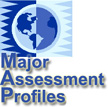| |


DEPARTMENT LINKS:
| |
|
|
|
|
PART I: QUALITATIVE INFORMATION
(NB: No revisions were made to this section in 2003.)
- Assessment
- Active student learning opportunities
- Strategies to improve P-16 teaching and learning
- Collaborative activities with business/industry
- Other:
- Elderhostel
(Summer 2002)· activities with Amish community, State-sponsored tours of Lincoln sites - 41 persons served· ROTC
activities - 20 children, age 9-122)
- Student Association of Family and Consumer Sciences students work with the Charleston Area Chamber of Commerce on Charleston Holiday Celebrations.
- Club
Managers Association of American · National Internship
and Placement Opportunities
- Partnership with US Army in Europe Child and Youth Services to provide career opportunities for qualified graduates of our program.
- Pass rates on any professional/ occupational licensure exams:
- Sanitation
Certification (Dates or Period of Time)· EIU Average 88%· State Average not available· National
Average not available2)
- Didatic
Program in Dietetics Certification Exam (July 1, 2001, through June 30, 2002)· EIU Average 78%· National Average 86%· State
Average not available3)
- Dietetic
Internship Certification Exam (July 1, 2001 through June 30, 2002)· EIU Average 69%· National Average 86%· State
Average not available4)
- Nutrition Education Certificate: 14 (based on completion of program from July 1, 2001-August 15, 20025)
- Illinois Certification Testing System (ICTS). Since summer of 2001, the SFCS had 20 students take the teacher certification examination. Of those 20, 19 students passed. Summer 2002, seven (100%) EIU-FCS students passed the exam with an average of 86; the statewide average was 83. Fall 2001 nine students took the exam; eight passed and one failed. The EIU-FCS student average was 78, and the statewide average was 80. Summer 2001, all four students who took the exam passed. The EIU-FCS average was 82, and the statewide average was 86.
- Faculty Achievements
- Student Achievements
PART II: QUANTITATIVE INFORMATION
FCS Data Spreadsheet (Excel)
- Enrollment:
Undergraduate: 443; Graduate: 85
- Degrees:
Undergraduate: 169; Graduate: 35
- Student Major Statistics
- Full-time
students: Undergraduate: 407; Graduate: 41
- Part-time
students: Undergraduate: 36; Graduate: 44
- Diversity:
Undergraduate: 53; Graduate: 18
- ACT: Undergraduate:
20.77
- GPA: Undergraduate:
2.71; Graduate: 3.27
- Faculty Statistics
- Total
faculty headcount: 23
- Total
FTE faculty: 19.68
- Full-time
faculty:
19
- Part-time faculty:
4- # faculty on leave:
0
- Total tenured/tenure track faculty: 14
- Faculty
break down by rank:
- Professor:
4
- Associate:
3- Assistant:
7
- # w/Terminal
degrees: 12
- Total annually-contracted
faculty: 5
- # w/Terminal
degrees: 0
- Non-negotiated
part-time faculty: 4
- Gender:
2 males, 21 females
- Diversity:
2
- Credit
Hour Production Total: 15,911
- Discipline
cost per credit hour by level: $194.20
- Direct
Cost Per Credit Hour Total: $91.67
- Freshman-Sophomore
Retention Rate: 71%
- Average
Actual Hours to Degree:137
- Required Hours to Degree:
- BS in FCS: 120
- MS in FCS: 30-32 (with Dietetics, 36-38)
- MA in Gerontology: 30-32
| |
| |
|
